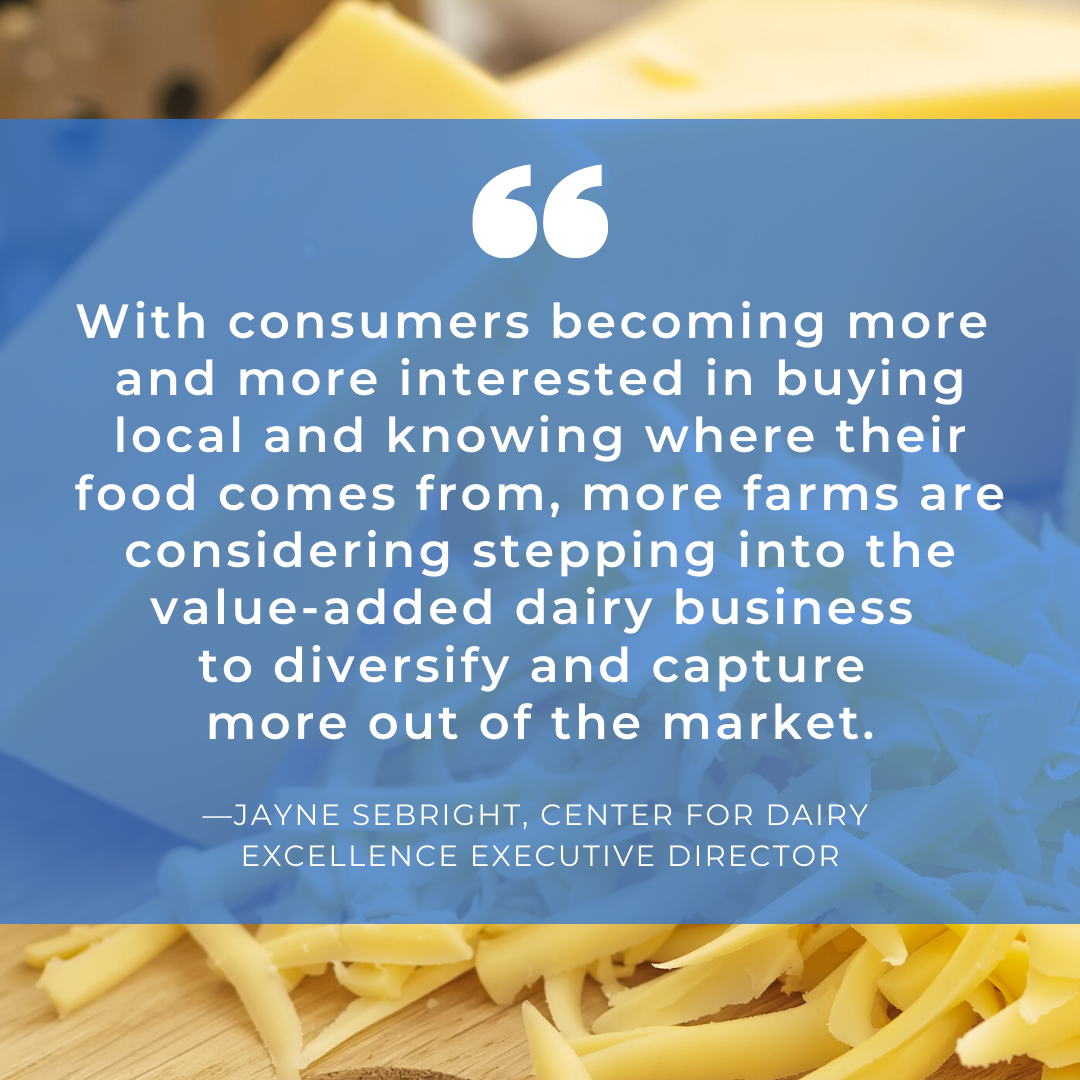At our On-Farm Dairy Innovation Forum in September, dairy producers were invited to learn more about how others stepped into the value-added dairy business and what it would take for them to do the same. With consumers becoming more and more interested in buying local and knowing where their food comes from, more farms are considering this option to diversify their business and capture more out of the market.
A highlight of the forum was a panel featuring three dairy businesses that are processing and marketing their own dairy products. Sue Miller, Rebecca Seidel and Mike Kosmicki each shared how they got started in the value-added business. In all three presentations, it became evident that their journey really started with a passion for cheese.
Mike is the procurement manager at Caputo Brothers Creamery, which is a small-scale artisan cheese shop in York County. Although the Caputos are not farmers, they are working directly with two farms to supply their creamery and plan to add more. Both David and Rynn Caputo, a husband and wife team, started their careers in the corporate world but developed a passion for cooking and good food while on their honeymoon in Paris.
During that trip, they tasted fresh, pulled mozzarella in Italy and fell in love with the product. That led them to start making cheese in their own kitchen while they pursued their dream of becoming chefs. Requests for their cheese poured in when the word spread that they were providing a unique cheese not commercially available anywhere else in the US, and the business grew from there. The name Caputo Brothers Creamery is in honor of their two young sons.
Start with Passion and a Plan
Sue and Rebecca both came from a farming background and decided to pursue cheese-making to keep their farms financially viable. Rebecca is from One Horn Farm where they are just starting out in the cheese business, while Sue became immersed in the cheese business more than 10 years ago. She and her husband milk about 80 cows in Chester County, near the suburbs of Philadelphia.
Sue’s story is like many Pennsylvania dairy farms. Birch Run Hill Farms is a small dairy with 80 cows and mostly rented cropland. Sue said they knew they needed to do something different, but they knew getting bigger and adding cows wasn’t in their future, particularly with where their farm is located. Sue said one night she woke up and thought, “I’m going to make cheese.”
They were fortunate to have access to a small cheese processing facility owned by a non-profit nearby, and they began exploring different recipes and varieties of cheese. When Sue talks about her cheese, she is incredibly passionate and speaks about how it has allowed their two sons to come back to the farm and be part of the business. Before she began making cheese, she milked the cows every day and did a lot with the genetics of the herd. But today she spends most of her time in the cheese room, while the cows are milked in a robotic barn and managed by one of her sons.
It was a paradigm shift for the family, but it allowed them to continue in farming and pursue their dream. Today Sue has been referenced by some as the “God Mother” of Pennsylvania’s Artisan Cheese Movement and works with the Pennsylvania Cheese Guild to encourage others who want to get started making cheese.

Just Like Most Dairies
During the panel discussion, both Sue and Rebecca emphasized how their family was really no different than most other farm families in Pennsylvania. They love dairy farming and knew it was the only thing they wanted to do, but they also understood they needed to do something different because just milking a small herd of cows wasn’t working anymore. Their passion for cheese gave them that opportunity.
They both admitted taking that first step was the hardest. There is a lot to think about when you consider the food safety requirements, marketing needs, and all the other details involved with processing your own product. But they both started with a vision, put a plan together and continue to work toward that plan. Sue even referenced a “vision board” that she and her family revisit often to continually refine their plan.
Right now, if farms are interested in pursuing value-added opportunities, whether it’s with cheese, ice cream, milk or other products, there’s help available. The Pennsylvania Department of Community of Economic Development just opened the second round of the Pennsylvania Dairy Investment Program, which offers grants for marketing, value-added, research and development, and transition to organic.
Farms interested in pursuing a value-added business or reinvesting in their existing value-added business can receive up to $50,000 to support their venture. Processors procuring milk from more than one farm can receive up to $500,000, and the grants only require a 15 percent match for the project. The application period opened in mid-September and will close on November 15. More details about the grant opportunity are available at dced.pa.gov/programs/pennsylvania-dairy-investment-program-pdip/. You can also call the DCED Office at (717) 787-6245 for more information.
If farms are interested in applying and would like help in reviewing their application, the Center for Dairy Excellence can help connect them to Small Business Development Centers willing to provide advice in the grant writing process. Also, if you missed the On-Farm Innovation Forum, you can access a copy by clicking here. It includes the panel and presentations on food safety requirements and the PDIP grant opportunity itself. If we can help, just give us a call at (717) 346-0849 or email me at jsebright@centerfordairyexcellence.org.
Editor’s Note: This column is written by Jayne Sebright, executive director for the Center for Dairy Excellence, and published monthly in the Lancaster Farming Dairy Reporter.

